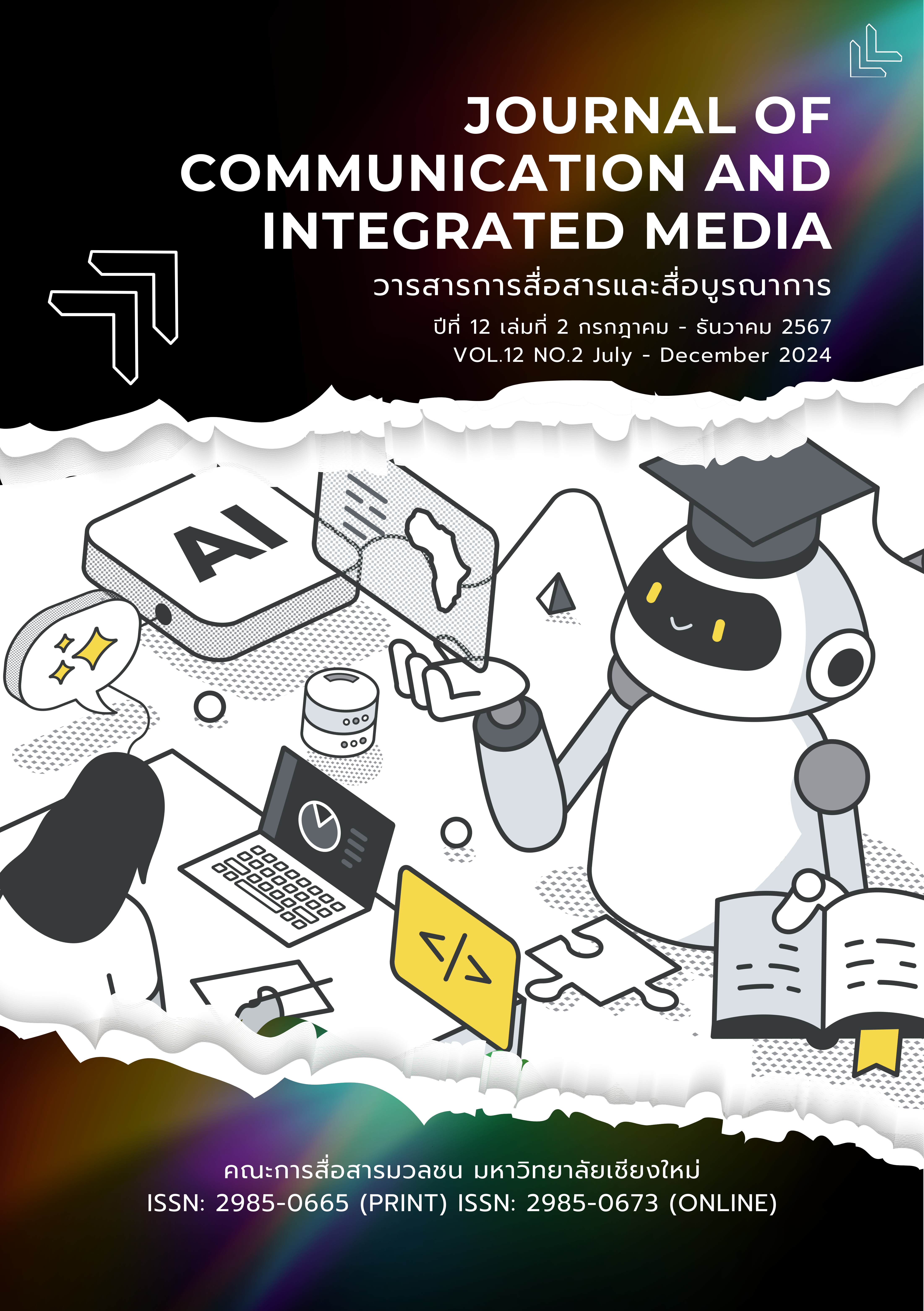การทำงานภาพยนตร์ข้ามอุปสรรคทางวัฒนธรรมและภาษา: กรณีศึกษาโครงการภาพยนตร์สั้นอิสระไทยและญี่ปุ่นเรื่อง “Afterglow”
Main Article Content
บทคัดย่อ
งานวิจัยนี้มีวัตถุประสงค์เพื่อสร้างกระบวนการทำงานร่วมระหว่างผู้ไม่รู้ภาษาและวัฒนธรรมของกันและกัน เพื่อทำให้เกิดการสร้างผลผลิตร่วมทางวัฒนธรรมเป็นภาพยนตร์สั้นอิสระระหว่างไทยและญี่ปุ่น และเพื่อประเมินผลผลิตจากวิธีการทำงานดังกล่าวผ่านการตีความของผู้ชมชาวไทย ระเบียบวิธีวิจัยประกอบไปด้วย 1) การวิจัยเชิงปฏิบัติการ (action research) โดยตัวผู้วิจัยเข้าไปเป็นส่วนหนึ่งของกระบวนการผลิตผลงานและหาทางแก้ไขปัญหาทางภาษาและวัฒนธรรม โดยมีเทคนิคการเก็บข้อมูลแบบสังเกตอย่างมีส่วนร่วม 2) การสัมภาษณ์เชิงลึก (in-depth interview) และ 3) แบบสอบถาม (questionnaire) กับกลุ่มผู้ชมภาพยนตร์
ผลการศึกษาเผยให้เห็นว่า ในการก้าวข้ามอุปสรรคทางภาษาและวัฒนธรรมเพื่อผลิตภาพยนตร์สั้นร่วมกันระหว่างไทยและญี่ปุ่น สามารถทำได้แม้ต่างฝ่ายต่างไม่รู้ภาษาของกันและกัน ตลอดจนใช้ภาษาสากล(ภาษาอังกฤษ) ได้ไม่ราบรื่น ด้วยกลยุทธ์ทางการสื่อสารอันได้แก่ 1) การเตรียมตัวล่วงหน้าโดยใช้เอกสารและแอปพลิเคชันทางภาษาอย่างละเอียด 2) การจัดหาผู้ประสานงานทางภาษาตามแต่โอกาสเอื้ออำนวย 3) การปรับตัวทางวัฒนธรรมในแบบคงเอกลักษณ์แต่พร้อมเรียนรู้สิ่งใหม่ 4) การปรับทัศนคติและพฤติกรรมทางการสื่อสารเพื่อบรรยากาศในการทำงาน
เมื่อนำภาพยนตร์มาจัดฉายเพื่อประเมินความเข้าใจในผลผลิตที่เกิดจากการทำงานข้ามวัฒนธรรมผ่านผู้ชมชาวไทย พบว่า มีความเข้าใจในโครงเรื่อง (plot) ความเข้าใจในแก่นความคิด (theme) ความเข้าใจในตัวละครหลัก (main characters) ความเข้าใจในความขัดแย้ง (conflict) ความเข้าใจในจุดยืน การเล่าเรื่อง (point of view) ความเข้าใจในการเลือกฉาก (setting) ความเข้าใจในสัญลักษณ์ (symbol) อยู่ในระดับดีทั้งหมด ผลการวิจัยดังกล่าวทำให้เกิดข้อค้นพบว่า ในบริบทที่แนวโน้มการทำงานข้ามวัฒนธรรมและข้ามภาษาของตนในอุตสาหกรรมภาพยนตร์ จะเพิ่มมากขึ้นในระดับโลก การทำงานแบบอิสระซึ่งมีงบประมาณไม่สูงนักและทีมงานไม่ชำนาญทางภาษาอื่นยังสามารถเป็นไปได้ ผ่านการเตรียมตัวที่ดี การปรับตัวให้มีประสิทธิภาพทางการสื่อสารกับทีมงานกลุ่มเล็ก การเพิ่มความรู้และความคิดในทางวัฒนธรรมและภาษาอื่น และการวางแผนแก้ไขปัญหาเฉพาะหน้า
Article Details

อนุญาตภายใต้เงื่อนไข Creative Commons Attribution-NonCommercial-NoDerivatives 4.0 International License.
ลิขสิทธ์ที่ผู้เขียนบทความต้องยอมรับ
เอกสารอ้างอิง
ขจิตขวัญ กิจวิสาละ. (2546). การวิเคราะห์เนื้อหาภาพยนตร์กระแสหลักในประเทศไทย [วิทยานิพนธ์ปริญญามหาบัณฑิต]. มหาวิทยาลัยธรรมศาสตร์.
ประชาชาติธุรกิจออนไลน์. (2566, 22 กรกฎาคม). สำรวจกองถ่ายหนังต่างชาติถ่ายทำในเมืองไทยสร้างรายได้ขนาดไหน?. https://www.prachachat.net/general/news-1353378
เมตตา วิวัฒนานุกูล. (2548). การสื่อสารต่างวัฒนธรรม. สำนักพิมพ์แห่งจุฬาลงกรณ์มหาวิทยาลัย.
วิโรจน์ สุทธิสีมา. (2564). ความเปลี่ยนแปลงของสื่อสตรีมมิงในอุตสาหกรรมภาพยนตร์ไทย: มุมมองจากกลุ่มผู้สร้างและผู้มีส่วนเกี่ยวข้อง. วารสารศิลปศาสตร์ มหาวิทยาลัยแม่โจ้, 9(2), 104-120.
หอภาพยนตร์ (องค์การมหาชน). (2564, 14 กันยายน). สำรวจนางสาวสุวรรณและโชคสองชั้นผ่านข้อถกเถียงว่าด้วย ‘หนังไทยเรื่องแรก’. https://www.fapot.or.th/main/information/article/view/805
Berry, W., Kim, U., Minde, T. & Mok, D. (1987). Comparative studies of acculturative stress. International Migration Review, 21, 491-511.
Buarqoub, I. A. S. (2019). Language barriers to effective communication. Utopía y Praxis Latinoamericana: vol. 24, núm. Esp.6.
Gudykunst, W. B. (1987). Cross-cultural comparisons. in C. Berger & S. Chaffee (eds.) Handbook of Communication Science. Newbury Park.
Hall, E. T. (1976). Beyond culture. Anchor Press/Doubleday.
Hayward, S. (2000). Cinema studies: The key concepts. Psychology Press.
IMDB. (2019, July 7). Afterglow. https://www.imdb.com/title/tt14209802/?ref_=nm_knf_t_2
Lustig, M. & Koester, J. (1993). Intercultural competence: Interpersonal communication across cultures. HarperCollins college Publishers.
Parc, J. (2020). Understanding film co-production in the era of globalization: A value chain approach. Global Policy, 11(4), 458-465.
Salmon, C. (2020, February 24). Lost in translation: when film-makers hit the language barrier. The Guardian. https://www.theguardian.com/film/2020/feb/24/film-makers-native-language-hirokazu-kore-eda-the-truth
Suwanpakdee, A. (2012). A Study of english communication problems and strategies used to solve problems between Thai and non-native english-speaking film crews while filming in Thailand [Master of Arts Thesis]. Srinakharinwirot University.
Wright, S. (1978). Evolution and the genetics of populations (Volume 4). University of Chicago Press.


